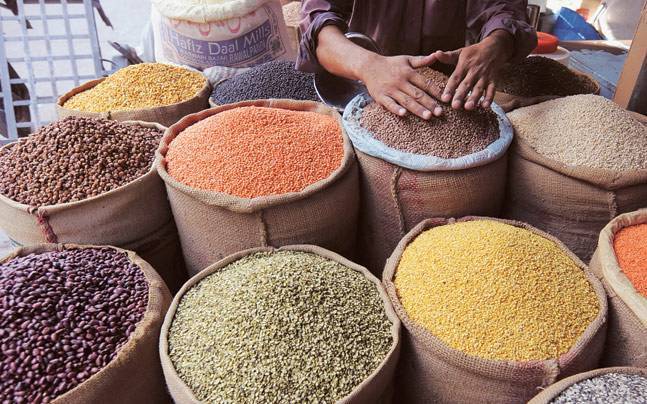New Delhi: Days after the government imposed stock limits on Tur and Urad to prevent their hoarding owing to poor availability of these commodities, the Union Cabinet Wednesday approved one of the highest rises in minimum support price (MSP) of several commodities in recent times for Kharif season (2023-24), including the ones mentioned above.
In a bonanza for farmers, the government announced an increase of Rs 143 in the minimum support price (MSP) of paddy to Rs 2,183 per quintal for this year, the second steepest increase in the last decade.
The highest increase in the paddy MSP in the last 10 years was by Rs 200 per quintal in 2018-19.
For 2023-24 kharif crops, MSP has been increased in the range of 5.3 to 10.35 percent, and in absolute terms, it has been increased by Rs 128 to Rs 805 per quintal.
The Cabinet Committee on Economic Affairs (CCEA), chaired by Prime Minister Narendra Modi, Wednesday, approved MSP of all mandated kharif crops that are grown in 2023-24 crop year and procured in Kharif Marketing Season (October-September).
Briefing media later, Food Minister Piyush Goyal said: “Farmers will benefit from the increase in the MSP at a time when the retail inflation is in a declining trend.”
“In agriculture, we have been fixing MSP from time to time based on the recommendations of CACP (Commission for Agricultural Costs and Prices). The increase in MSP of the kharif crops for this year is highest compared to the previous years,” he added.
In Kharif cereals, the MSP of the ‘common grade’ paddy has been increased by 7 percent (Rs 143) to Rs 2,183 per quintal for 2023-24 from Rs 2,040 in the previous year. The support price of ‘A’ grade variety of paddy has been raised by Rs 143 to Rs 2,203 per quintal from Rs 2,060.
Jowar (hybrid) and jowar (maldandi) MSP have been fixed at Rs 3,180 and Rs 3,225 per quintal respectively, which are 7 percent and 7.85 percent higher than Rs 2,970 and Rs 2,990 in 2022-23.
Maize MSP has increased by 6.5 percent to Rs 2,090 per quintal for 2023-24 from Rs 1,962 per quintal in 2022-23. The MSP for ragi has been increased by 7.49 percent to 3,846 per quintal for 2023-23 from Rs 3,578 per quintal in 2022-23.
Paddy is the main kharif crop, the sowing of which normally begins with the onset of southwest monsoon. The India Meteorological Department (IMD) has projected a normal monsoon for the June-September period despite the evolving El Nino conditions.
Asked about the double-digit inflation in cereals, Goyal said the inflation is lower than other countries while stressing that this is reflective of a rise in demand for cereals owing to an increase in income.
The PM has given high priority to check food inflation, which is much under control compared to other countries, he said, adding that a group of ministers under Home Minister Amit Shah regularly meets to take stock of the situation.
Among pulses, moong has seen the maximum increase of 10.35 percent in MSP at Rs 8,558 per quintal in 2023-24 from Rs 7,755 per quintal in 2022-23.
Tur support price has been increased by 6.06 percent to Rs 7,000 per quintal from Rs 6,600 per quintal, while that of urad MSP has been raised by 5.3 percent to Rs 6,950 per quintal from Rs 6,600 per quintal in the said period.
In oilseeds, sesamum MSP saw an increase of 10.28 percent to Rs 8,635 per quintal in 2023-24 from Rs 7,830 per quintal in 2022-23, followed by groundnut MSP by 9 percent to Rs 6,377 per quintal from Rs 5,850 per quintal, and soyabean (yellow) MSP by 6.97 percent to Rs 4,600 per quintal from Rs 4,300 per quintal in the said period.
The MSP of niger seed has been increased by 6.13 percent to Rs 7,734 per quintal in 2023-24 from Rs 7,287 per quintal in 2022-23, while sunflower seed MSP has been increased by 5.6 percent to Rs 6,760 per quintal from Rs 6,400 per quintal in 2022-23.
Among cash crops, cotton (long stable) and cotton (medium stable) MSP have been fixed at Rs 7,020 per quintal and Rs 6,620 per quintal respectively, which are 10.03 percent and 8.88 percent higher than Rs 6,380 and Rs 6,080 in 2022-23.
In a statement, the government said it has increased the MSP of Kharif crops for 2023-24 to ensure remunerative prices to the growers for their produce and to encourage crop diversification.
The increase in MSP is in line with the Union Budget 2018-19 announcement of fixing the MSP at a level of at least 1.5 times of the All-India weighted average Cost of Production, aiming at reasonably fair remuneration for the farmers, it said.
“The expected margin to farmers over their cost of production are estimated to be highest in case of bajra (82 percent) followed by tur (58 percent), soybean (52 percent) and urad (51 percent). For the rest of the crops, the margin to farmers over their cost of production is estimated to be at least 50 percent,” it added.
In recent years, the government said it has been promoting the cultivation of crops, other than cereals, by offering a higher MSP for crops such as pulses, oilseeds and nutri-cereals.
Additionally, the government has also launched various schemes and initiatives, such as the Rashtriya Krishi Vikas Yojana (RKVY), the National Food Security Mission (NFSM), to encourage farmers to diversify their crops.
Due to government measures, there has been a substantial increase in the country’s foodgrain production in the last few years. As per third advance estimates for the 2022-23 crop year (July-June), total foodgrain production in the country is estimated at a record 330.5 million tonnes.
PTI
